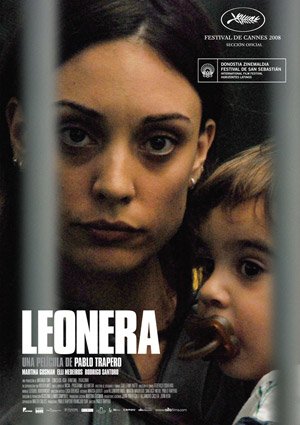
LEONERA
Argentina, 2008, 113 minutes, Colour.
Martina Gusman, Elli Medeiros, Rodrigo Santoro.
Directed by Pablo Trapero.
There have been many prison films but one like this is comparatively rare. It is a gripping film that has its audience wondering what is the right thing to do for prisoners. But this question is complicated here because the prisoners are women and the group is made up of pregnant women and women with children under the age of four, some of whom were born in prison, all of whom live in the prison, behind bars.
Leonera opens like many a crime drama. A woman wakes with blood on her hands but ignores the bodies in her apartment and goes to work and study. It is only when she returns home that the enormity hits her and, while she calls the police, she is paralysed with panic. One of the men is still alive and recovers in hospital. She, Julia, is arrested for murder.
Filmed in prison locations, most of the action takes place there, in these women’s wards. There are endless corridors and doors to be unlocked. There is solitary. There is also a common space and places where the mothers can be with their children as well as a kindergarten. (And all the time those questions about whether the children are going to be adversely affected without a male parent, living in prison and its routines, with the effect on their incarcerated mothers.) Julia is pregnant and eventually gives birth to a little boy, Tomas.
The guards are not really brutal, just tough and demanding. The head of the prison shows some sympathy, so it is not a drama of them against us, although there is a small riot and fire before the end. Rather, the women manage. Marta, a tough woman with more than one child, helps Julia, as well as making sexual advances to her. Julia’s mother who had left her 13 years earlier to live in France, returns and there is some kind of rapprochement between the two, although the mother sets in motion plans to take Tomas from prison and care for him. A lawyer gives her a script for her case but the surviving man has his own version of what happened and Julia is sentenced for wilful murder. The screenplay never quite makes clear the detail of what happened but that is not the point.
And the ending. Julia has spent many years in prison by this and has become more worldly-wise but still longs for her son. And, as the final credits roll, we are still wondering whether justice has been done for both Julia and Tomas.
1.A prison film with a difference?
2.The Argentine settings, the city, the prison, the enclosed world, the corridors, the cells, space, the contrast with the outside and the beauty of the countryside, the river?
3.The opening song, the musical score, the children singing? A tone for the film?
4.The effect of this prison film because of the women, the children, the pregnant women, all together? The children together? Up to four years in the prison, the effect on their education, the lack of a male parent, the kindergarten, the routines of the prison, the bars, the visits? The range of questions for audiences throughout the film about the effect for the children?
5.The mothers, their experience, pregnancy, birth, caesareans, feeding the children and the difficulties, the crying children, their growing up, the demands of mothering and the skills or not of the prisoners, the kindergarten for the children, the celebrations like Christmas? The mothers’ and children’s needs, the mothers forfeiting their children at four years old? Audiences asking questions about the women, mothering?
6.The initial crime, the blood, Julia waking, the shower, going to work and study, coming home, the bodies, her panic, the phone call, the police, inarticulate, her arrest?
7.The treatment, the fingerprints, the search, travel to the jail, the entry, the guards, the cell, no water, going into the common space, the inmates and their attitudes, life in the prison, the women together, the importance of details, the initial roll-call?
8.The portrait of the guards, strong, not corrupt, having to stop the fight? The chief and his handling of Julia’s situation?
9.Julia, her age, in herself, her mother leaving her, her relationship with the men, student, the situation of the deaths, whether we knew the truth or not? The effect, her being pregnant, her pains, the birth? Marta and her help? The sexual attraction? Marta and her ability to soothe Tomas? Helping, leaving the prison? Her later helping with getting the advocate, with the passports?
10.Julia’s mother, in France, the phone calls, the parcels and gifts, her return, the tension between the two, the visits, sharing experiences like the Christmas celebration? Taking Tomas, not returning him, the animosity between the two? The end and leaving the baby with Julia?
11.Romero, his visits, making the toy, testifying, lies or truth, Julia and her relationship with Romero, with the dead man? The confrontation and their argument in front of the judge, his going free?
12.Julia, her anger, the women supporting her, the riot, the intervention of the chief?
13.The hearing, the judge, evidence, confrontation, the verdict?
14.The years passing, Julia becoming calmer, her life, helping others to be literate, the preparation for the visit?
15.The visit home, the journey, playing with Tomas, locking the door, leaving with him, the taxi, telling him the story, in the bus, meeting Marta, getting the passports?
16.The barge, examination of the passports, going into freedom – and disappearing into the woods?
17.Prisons, society, justice, treatment of prisoners, women and children?